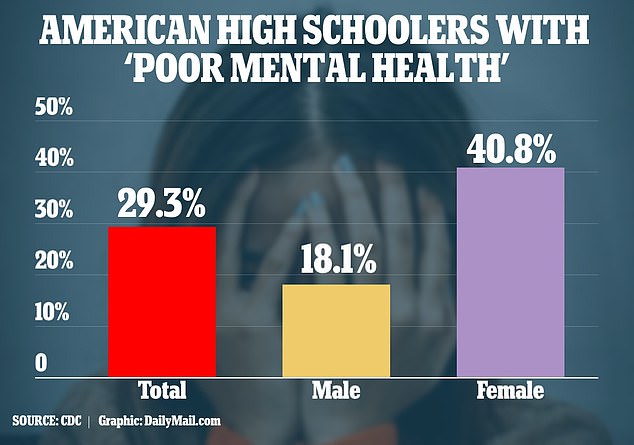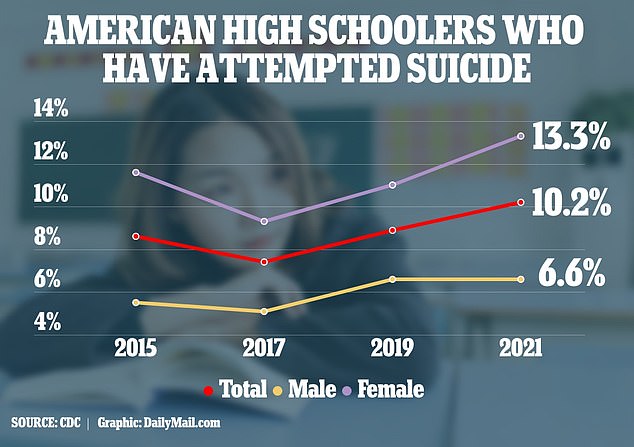Overthinker? Groundbreaking new therapy could stop those repetitive thoughts that drive you mad
A new type of ‘groundbreaking’ mental health therapy could help teenagers stop overthinking, according to recent research.
Overthinking, also called rumination, is known to be one of the biggest risk factors for depression and anxiety — which affects about 44 percent of American teens, studies show.
These thought patterns involve obsessing about the future, but also regretting past events and behaviors.
The latest study used brain scans to show that a specific type of cognitive behavioral therapy can reduce connectivity between parts of the brain associated with obsessive thinking – and break the negative thought loop.
Ten to fourteen sessions of cognitive behavioral therapy focused on rumination reduced the teen participants’ focus on negative experiences, which caused them severe anxiety and fear.
Experts have found strikingly positive results for a new type of cognitive behavioral therapy, which can change connections in the brain to reduce symptoms of depression
The results – produced by psychiatrists from Ohio State University and the University of Utah – extended previous research by British and American scientists, which showed that adults with depression benefit from the approach. These findings were described by the scientific website Science daily as ‘groundbreaking’.
Depression affects 21 million American adults and nearly 4 million teens. It is one of the most expensive conditions to treat and the leading risk factor for suicide, the fourth leading cause of death among young adults worldwide.
Current treatments, including antidepressants and standard cognitive behavioral therapy, only work for a third to a half of teens.
A an estimated 55 percent adults those treated for depression will have recurrent episodes.

Nearly a third of all American high school students report suffering from poor mental health. Young women suffer the most: in 2021, 40 percent report emotional or psychiatric problems
Dr. Rachel Jacobs, a professor of psychiatry at Northwestern University who conducted the first series of studies on this intervention in 2016, said: “As a clinician, I continued to observe that standard CBT tools like cognitive restructuring were not giving young people the tools to break out of painful mental vicious cycles.” that contribute to the experience of depression.’
‘If we could find a way to do that, we might be able to help young people stay healthy during the transition to adulthood, which has become even more important since we’ve seen the impact of Covid-19 on mental health.’
The researchers believe that initiating rumination-focused cognitive behavioral therapy (RF-CBT) in combination with traditional therapy could significantly reduce the number of millions of young people who end up becoming chronically depressed.
They enrolled 76 teenagers between the ages of 14 and 17 with a history of depression and divided them into two groups: 39 underwent RF-CBT and 37 did not.
Each participant underwent a brain scan before and after the study and completed a survey to measure the frequency of overthinking.
At the end of the intervention, 35 of the 39 RF-CBT patients saw their rumination scores decrease, with an average decrease of approximately 18 percent.
Meanwhile, 28 out of 36 people who received standard depression treatment saw their scores drop, and the average drop was much lower: less than two percent.
In addition, MRI scans also showed improvements.
However, the study did not measure changes in depression or anxiety scores.
Specifically, researchers noticed a reduction in the connection between the left posterior cingulate cortex – responsible for memory, including imagining the future – and two other regions: the right inferior frontal gyrus and the right inferior temporal gyrus.
These zones control various cognitive functions, including working memory, impulse control and decision-making, and our ability to create and store visual memories.
Previous research has suggested that reducing the connectivity between these regions reduces the types of repetitive thought processes that cause mental problems.
Dr. Ed Watkins, professor of experimental psychology at the University of Exeter who developed RF-CBT, said: ‘For the first time this paper shows that the version of rumination-focused CBT we developed at the University of Exeter leads to changes in cognitive behavioral therapy. connectivity in brain areas in adolescents with a history of depression.

The CDC found that one in 10 U.S. high school students attempted suicide in 2021, up from 8.9 percent the year before. Women were hit hardest: 13.3 percent attempted suicide that year
‘This is exciting because it suggests that this CBT may help patients gain control over rumination more easily, or make it less of a habit. We urgently need new ways to reduce rumination in this group and thus improve the mental health of our young people.”
Their findings were published in the journal Biological Psychiatry Global Open Science.
Youth mental health services took a nosedive during the pandemic, due to extended periods of isolation from school and social activities.
A 2021 report from the Centers for Disease Control and Prevention (CDC) found that more than a third of high school students reported poor mental health during the pandemic, and 44 percent reported feeling persistently sad or hopeless.
More recent figures reflecting the general population show that the overall suicide rate in the US will reach an all-time high in 2022 – an increase 16 percent since 2011.
